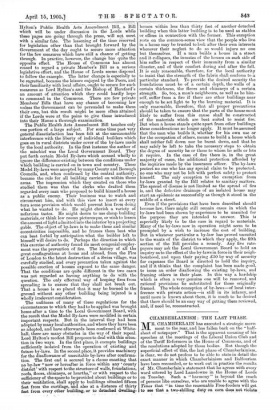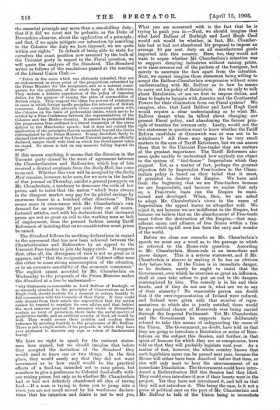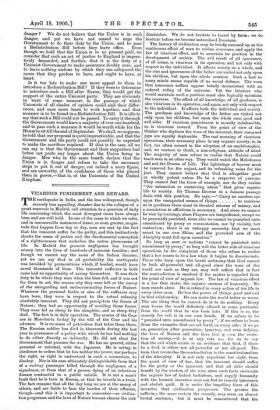CHAMBERLAINISM : THE LAST PHASE. the essential principle any more
than a one-shilling duty ; that if it did we must not be pedantic, as the Duke of Devonshire observes, about the application of a principle ; and that, if we again mitigate our infraction by remitting to the Colonies the duty we have imposed, we are quite within our rights." In default of being able to state for ourselves the exact position now assumed by the bulk of the Unionist party in regard to the Fiscal question, we will quote the analysis of the Standard. The Standard writes as follows of the resolutions passed at the meeting of the Liberal Union Club :- "Taken in the sense which was obviously intended, they are an endorsement in every point of the propositions submitted by the Prime Minister for the acceptance, and as a natural conse- quence for the guidance, of the whole body of his followers. They include a definite repudiation of the policy of imposing duties for the purpose of raising the price of commodities of British origin. They support the claim for powers of retaliation in cases in which foreign tariffs prejudice the interests of British commerce. Lastly, they advocate closer commercial union with the Colonies on the basis of preferential duties, which are to be settled by a Free Conference between the representatives of the Colonies and the Mother Country. It cannot be pretended that the programme thus outlined is a literal transcript of the views defined in the Manchester speech ; but it does not extend the application of the principles therein enunciated beyond the limits contemplated by the Prime Minister. It may, therefore, fairly be claimed that the opinion of the Liberal Unionist party, as officially declared, ranges itself with that on which the Government takes its stand. No stress is laid on any measure falling beyond its scope."
If this means anything, it means that the disunion in the Unionist party caused by the want of agreement between the Chamberlainites and Balfourites, which has of late received a diurnal emphasis from the Daily Mail, has come to an end. Whether this view will be accepted by the Daily Mail remains, however, to be seen, for we note in the leader of that journal on Thursday, amidst a general panegyric on Mr. Chamberlain, a tendency to denounce the evils of low prices, and to insist that the nation " which buys always in the cheapest market may pay for its pitiful savings by enormous losses in a hundred other directions." This seems more in consonance with Mr. Chamberlain's own demand for an average 10 per cent. duty on all manu- factured articles, and with his declarations that increased prices are not so great an evil to the working man as lack of employment, than the present fashion among Tariff Reformers of insisting that on no consideration must prices be raised.
The Standard follows its soothing declarations in regard to the agreement that has now been achieved between the Chamberlainites and Balfourites by an appeal to the Unionist Free-traders to join the happy circle. It suggests that, after all, the divergence of view is not so great as it appears, and "that the resignations of Cabinet office were due either to some strong misconception of the situation, or to an excessive sensibility of the economic conscience." The explicit assent accorded by Mr. Chamberlain on Wednesday to the proposals of the Prime Minister makes the Standard at a loss to understand— "why Statesmen so reasonable as Lord Balfour of Burleigh, or so sincerely attached to the principles of Conservatism as Lord Hugh Cecil, should hesitate for a moment to return frankly to full communion with the Councils of their Party. If they could only dismiss from their minds the superstition that the nation cannot be trusted to regulate its own affairs, and that, behind the most innocent proposal for measures which in themselves contain no taint of protection, there lurks the awful spectre of prohibitive tariffs, and an artificial scarcity of food, all would be well. They would secure their position and confirm their influence by acceding heartily to the programme of Mr. Balfour. There is not a single article of his proposals in which they have ever professed to discover any sign or token of fundamental heresy."
We have no right to speak for the eminent states- men here named, but we should imagine that before they accepted the invitation of the Standard they would need to know one or two things. In the first place, they would surely say that they did not want assurances as to how small would be the practical effects of a food-tax intended not to raise prices, but somehow to give a preference to Colonial food-stuffs with- out raising prices, but only as to whether Mr. Chamberlain had or had not definitely abandoned all idea of taxing food.—If a man is trying to force you to jump into a river, you are not much moved by his vociferous declara- tions that his intention and desire is not to ' wet you. What you are concerned with is the fact that he is trying to push you in.—Next, we should imagine that what Lord. Balfour of Burleigh and Lord Hugh Cecil would ask would be whether, in fact, Mr. Chamber- lain had or had not abandoned his proposal to impose an average 10 per cent. duty on all manufactured goods imported into this country. Here, too, they would not want to argue whether Mr. Chamberlain's intention was to support decaying industries without raising prices, or to raise revenue out of the pockets of the foreigner, but merely to ascertain the fact apart from the intention. Next, we cannot imagine those statesmen being willing to accept the Balfour-Chamberlain compromise without some understanding with Mr. Balfour as to how he means to carry out his policy of Retaliation. Are we only to talk about Retaliation, or are we first to impose duties, and then to begin to bargain with America and the Continental Powers for their elimination from our Fiscal system? We imagine, also, that Lord Balfour and Lord Hugh Cecil would require a clear understanding as to what Mr. Balfour meant when he talked. about changing our present Fiscal policy, and abandoning the former prin- ciple of taxation for revenue only. Lastly, would not the two statesmen in question want to know whether the Tariff Reform candidate at Greenwich was or was not to be withdrawn ? All these may appear to be very small matters in the eyes of Tariff Reformers, but we can assure them that to the Unionist Free-trader they are matters of the greatest importance. The Tariff Reformers also seem quite unable to understand. how anybody can object to the system of " tied-house " Imperialism which they suggest. Yet, as a matter of fact, perhaps the greatest objection felt by Imperialist Free-traders to the Cham- berlain policy is based. on their belief that it must, if persisted in, destroy the Empire. We have said from the beginning that we are Free-traders because we are Imperialists, and because we realise that only on a Free-trade basis can the Empire be main- tained and developed. When, then, we are asked to adopt Mr. Chamberlain's views in the name of Imperialism the appeal leaves us altogether cold. We reject it, not because we are indifferent to the Empire, but because we believe that on the abandonment of Free-trade must follow the destruction of the Empire,—that mag- nificent union and alliance of free States within a free Empire which up till now has been the envy and wonder of the world.
Before we close our remarks on Mr. Chamberlain's speedh we must say a word as to the passage in which he referred to the Home-rule question. According to Mr. Chamberlain, Home-rule is an immediate and grave danger. This is a serious statement, and if Mr. Chamberlain is sincere in making it he has an obvious duty before him. If the Union is in immediate danger, as he declares, surely he ought to insist that the Government, over which he exercises so great an influence, shall at once take action to put an end to the dangers contemplated by him. The remedy is in his and their hands, and if they do not use it, what are we to say of their sincerity ? No reasonable person can doubt that if the over-representation of Ireland were reduced, and Ireland were given only that number of repre- sentatives to which she is justly entitled, there would be no practical chance of Home-rule ever being carried through the Imperial Parliament. Yet Mr. Chamberlain and the Government he supports have deliberately refused to take this means of safeguarding the cause of the Union. The Government, no doubt, have told us that they are going to introduce a Resolution or series of Reso- lutions on the subject this Session, and further, in that spirit of humour for which they are so conspicuous, have told us that they will probably legislate next year. As a matter of fact, however, the whole country knows that such legislation never can be passed next year, because the House will either have been dissolved before that time, or else. will only meet to hear the announcement of an immediate Dissolution. The Government could have intro- , duced a Redistribution Bill this Session had they liked. , They could even introduce it now if their hearts were in the project. Yet they have not introduced. it, and tell us that they will not introduce it. This being the case, is it not a piece of political cant on the part of Mr. Chamberlain and Mr. Bailout' to talk of the Union being in inimediate danger ? We do not believe that the Union is in such danger, and yet we have not ceased to urge the Government to do their duty by the Union, and to pass a Redistribution Bill before they leave office. Even though we hold that the Union is in no present peril, we consider that such an act of justice to England is impera- tively demanded, and further, that it is the duty of a Unionist Government to make assurance doubly sure, and to leave nothing undone by which they can safeguard the cause that they profess to have, and ought to have, at heart. '
Is it too late to make one more appeal to them to introduce a Redistribution Bill ? If they were to determine to introduce such a Bill after Easter, they would get the support of .the entire Unionist party. They are obviously in want of some measure in the passage of which Unionists of all shades of opinion could sink their differ- ences, and once more learn to work together, and that measure is to be found in a Redistribution Bill. It is idle to say that such a Bill could not be passed. To carry it through the Government would have a majority of over one hundred, and to pass such a measure it would be worth while for the House to sit till the end of September. We shall, we suppose, be told that our proposal is quite impracticable, and that the Government and the party could not possibly be expected to make the sacrifices required. If that is the case, all we can say is that the Government and their supporters had better not prate any longer about the Union being in danger. 'Men who in the same breath declare that the Union is in danger and refuse to. take the necessary steps, to put it out of danger, cut indeed a sorry figure, and are unworthy of the confidence of those who placed. them in power,—that is, of the Unionists of the United Kingdom.












































 Previous page
Previous page